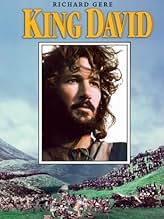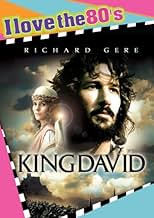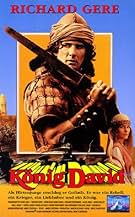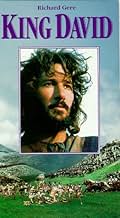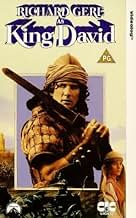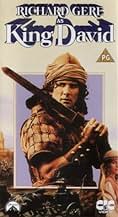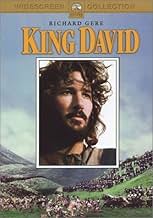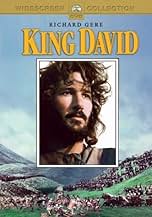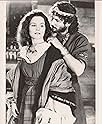Rei Davi, estrelando Richard Gere, segue a história real de um simples pastor cuja coragem e bravura o ajudaram a ascender ao trono da antiga Israel.Rei Davi, estrelando Richard Gere, segue a história real de um simples pastor cuja coragem e bravura o ajudaram a ascender ao trono da antiga Israel.Rei Davi, estrelando Richard Gere, segue a história real de um simples pastor cuja coragem e bravura o ajudaram a ascender ao trono da antiga Israel.
- Direção
- Roteiristas
- Artistas
- Prêmios
- 1 indicação no total
Avaliações em destaque
"King David" (1985) stars Richard Gere in the titular role and covers the bulk of the events. You'll see all the following happenings in the picture:
Samuel's choosing of David as successor to King Saul; Israel's battles with the Philistines; the fight with the hulking Goliath and David's victory with a sling shot; David playing his harp to soothe Saul's torment; Saul's increasing jealousy and hatred of "the man after God's own heart"; David & Jonathan's brotherly love; David's wandering in the wilderness with his men, fleeing Saul; his stealing of Saul's spear while he sleeps in a cave, sparing him; Saul's suicide; David dancing in his skivvies when the Ark of the Covenant is brought into Jerusalem; Michal's love and, later, hatred of David (as he dances before the LORD); David secretly ogling the nude Bathsheba bathing from his palace roof and the ensuing adultery; David's indirect murder of Uriah (Bathsheba's husband) and Nathan's rebuke; Amnon's rape of his half-sister Tamar; Absalom's justified slaying of his half-brother Amnon; Absalom's stealing of the Israelite's hearts; Absalom's death and David's grieving
The film is worthwhile if you desire to see these numerous events depicted before your eyes. The cast, sets, costumes, locations and filmmaking are for the most part of the highest order for 1985. Edward Woodward is excellent as the jealous and bitter King Saul, even though he lacks Saul's height (as he was a head taller than any other Israelite). Most aspects of the David/Goliath challenge are great, like the troops shown on two separate hills. Cherie Lunghi possesses an intelligent and unique beauty as David's first wife, Michal, while Alice Krige is beautiful as Bathsheba.
Despite the numerous events covered in David's life, the film only runs 1 hour and 50 minutes before the closing credits. The problem with this is that there's at least 3 hours of material and shortening it down to less than 2 hours prevents the viewer from being captivated by the myriad characters and happenings. This will leave some struggling to connect with the people and their stories.
Regardless of the numerous events flying by, the film has a bit of a lazy vibe. There's very little spectacle like "The Ten Commandments," but it's more realistic. David was a ruddy and handsome man, according to the Bible, and Gere is quite good in the role. Yet David was a very passionate, a "man after God's own heart, which is effectively shown in some parts, like what he does with the model of the Temple at the end, but not in others, like when the boy fights Goliath there's zero passion and righteous ferocity as seen in the Biblical account (e.g. "Who is this uncircumcised Philistine who would defy the armies of the living God?!!"). Plus the film doesn't show the serious trash-talking that went back and forth between the two. The fight's just too low-key.
Although the gist of the story is accurate there are inaccuracies that some nitpick, e.g. Goliath challenged David and the Israelites himself, he didn't speak through another man; David picked up stones before going out to fight the giant, not while fighting him; Absalom waited a long time before slaying Amnon, he didn't do it immediately; etc. Changes like these aren't that big of a deal and were made for dramatic or condensing reasons.
Someone criticized the film for showing Bathsheba at fault for seducing David. Actually, they both shared fault equally. Everyone in Jerusalem knew the king stayed home while the troops were out fighting, so Bathsheba was likely fully aware that the king could catch a tantalizing glimpse of her while she was bathing on the nearby roof. Besides, even though David was the king, she could have said 'no' when the proposition of adultery later presented itself. In other words, she was both into it and into David.
I've seen "King David" four times now and enjoy it every time. It's a well-done cinematic account of David's life for 1985 with a kinda weak ending. But the picture cuts off more than it can chew in a mere 1 hour and 54 minutes, leaving the viewer detached from the characters and events beyond David, in particular those who know little about the biblical account.
But don't listen to those who give this film an absurdly low rating. They're way off. It's good; it just lacks the detail to make it great. Nevertheless, I'd watch "King David" any day over the overrated "Braveheart."
The movie was shot in Italy with studio stuff done Pinewood Studios, London.
GRADE: B
Described by David Thomson as "a genuine eccentricity", it's very much of it's time, including a spot of slow motion swordplay, gorier violence than in the fifties and the scruffy eighties beards and shaggy mullets worn by the men as they address each other in hushed tones.
This second Golden Age lasted until about the mid-sixties, with Huston's "The Bible" perhaps marking its close. Thereafter there were occasional productions based on the New Testament, but the Old no longer seemed to be of interest to film-makers. "King David", therefore, made in 1985, is virtually unique, an Old Testament epic from the eighties, a decade during which not only Biblical epics but also those based on Classical or Mediaeval history had fallen from favour. When eighties film-makers wanted to work in the epic style they generally turned to modern history, as Richard Attenborough did with "Gandhi" or Bertolucci with "The Last Emperor".
The look of this film is far less grandiose than that of the traditional epics directed by the likes of DeMille. I think that this is historically accurate; the Kingdom of Israel was not a great empire like Rome, Egypt, Babylon or Persia but a modest Middle Eastern state, notable not for its wealth or power but for the fact that its monotheistic religion gave rise not only to modern Judaism but to Christianity and Islam as well. The costumes and architecture, therefore, are far more sober and restrained than those on view in most epics, and the battle scenes are fairly small-scale.
The film is relatively faithful to Biblical accounts of the life of David, although there are some discrepancies. Filming this particular story does, however, pose some problems which director Bruce Beresford and the scriptwriters never really overcome. The first problem is that the story of David is one of the Bible's more complex narratives; this film draws upon four different Books, Samuel I and II, Chronicles I and the Psalms. (Some well known Biblical heroes have their stories told in a few verses, or at most chapters). This narrative contains several different stories- the power struggle between David and Saul, the friendship between David and Jonathan, the love-story of David and Bathsheba and the rebellion of Absalom- any one of which could have been the basis of a complete film in its own right. This film tries to deal with all of them, and does so rather perfunctorily. An example of what I mean is that Bathsheba's husband Uriah the Hittite never appears, even though as the third party in the triangle he would be a key figure in the love-story element. David's estranged first wife Michal is not omitted entirely, but her role here is a very minor one.
The second problem- one common to a lot of Biblical epics- is the discrepancy between the harsh and often intolerant tribal morality of Old Testament religion and the gentler ethos of modern Christianity. In the film David is seen as the advocate of a greater tolerance when he spares the lives of the Philistine civilians after defeating their armies, an act of mercy for which he is taken to task by the prophet Nathan. Nathan's position is that if Jehovah has mandated the wholesale slaughter of pagan nations, then it is not for David, as Jehovah's anointed, to question the justice of His commands.
There is an attempt to soften, even justify, the David/Bathsheba affair by painting Uriah as a brute who refuses to consummate his marriage and who treats his beautiful young wife with savage cruelty, a version of events not found in the Biblical story This does not, however, prevent the scriptwriters from presenting us with the scene (which is in the Bible) where Nathan rebukes David for adultery and his part in Uriah's death, although its impact is lessened by the fact that the man now appearing as the voice of conscience and morality was, only a few scenes earlier, appearing as the advocate of religiously sanctioned genocide.
The best acting contribution, by a considerable margin, comes from Edward Woodward as the tormented Saul, a man quite literally driven mad by rage and by his unreasoning jealousy of David. (Woodward was better known for his television work than for films, but he had earlier collaborated with Beresford on the excellent "Breaker Morant"). Richard Gere, however, seems miscast in the title role; even Beresford was later to admit that Gere, who received a Razzie nomination for "Worst Actor", is much better in contemporary pieces than he is in historical dramas. Alice Krige as Bathsheba is never given much to do except stand around looking beautiful. There are a surprising number of little-known actors, some in quite major roles. It would, for example, make an interesting quiz question to test the knowledge of the most enthusiastic movie buff to name two films starring, say, Jack Klaff (Jonathan) or Jean-Marc Barr (Absalom).
Like a number of other reviewers I was amused by that scene in which Gere, dressed only in a loincloth, does a dance through the streets of Jerusalem. Yes, I know it's in the Bible- it was presumably part of the coronation ritual of the Israelite monarchy- but that doesn't prevent it from looking ridiculous. That last comment, in fact, could sum up my view of the film as a whole. A lot of this stuff might be in the Bible. That doesn't necessarily mean you can put it in a modern film without looking ridiculous. 5/10
Everything is fine until Richard Gere shows up. It's a bit slow sometimes but Woodward is a solid British actor. The scale is big enough when it's required. Goliath is great. It's all good but there is something too modern about Gere's beautiful hair. His mannerisms and his voice is too modern, too American and too different from everybody else. He simply looks out of place. Otherwise, this could have worked.
Você sabia?
- CuriosidadesRachel Weisz was offered a large part in this film when she was only 14, but her parents would not allow her to do it.
- Erros de gravaçãoThe "Star of David" on the shields and military standards is inaccurate. The symbol only came into common usage as a religious/national symbol many decades later. (Some believe during the middle ages) Assuming that this symbol represents David, as the name suggests, this would not be an Israelite symbol until the time of David's Kingship. This is out of place during the reign of King Saul.
- Citações
[first lines]
Saul's guard: The king cannot speak with you now. He is engaged in the affairs of state.
Samuel: Since when have the affairs of state taken precedence over the affairs of God?
[shoves his way past and enters Saul's throne room]
Saul: ...Samuel. We welcome you. With God's blessing, our victory is complete.
Samuel: Is THIS how you show Him your gratitude... by robbing the Amalekites of their women and cattle? By holding their king in chains?
Saul: We were discussing a possible treaty. The king is to be ransomed...
Samuel: A *treaty?* *Ransom?* Saul, for this you have betrayed your own soul in the sight of God. His instructions were plain enough: "... Spare nothing from the sword."
[beheads the Amalekite king]
Samuel: ... When our tribes clamored for a king, to make us like other nations, I answered them: "We are not like other nations. The Lord of Hosts is both our God and our King." The people said, "We want a king we can see. We want a king of our own flesh and blood."
[holds up the severed head]
Samuel: Here are your kings of flesh and blood. Here is a king you can see.
[throws the head at Saul's feet]
- ConexõesFeatured in At the Movies: King David/Lady Hawke/Fraternity Vacation (1985)
Principais escolhas
Detalhes
- Data de lançamento
- Países de origem
- Idioma
- Também conhecido como
- Rei Davi
- Locações de filme
- Empresas de produção
- Consulte mais créditos da empresa na IMDbPro
Bilheteria
- Orçamento
- US$ 22.000.000 (estimativa)
- Faturamento bruto nos EUA e Canadá
- US$ 5.111.099
- Fim de semana de estreia nos EUA e Canadá
- US$ 2.212.481
- 31 de mar. de 1985
- Faturamento bruto mundial
- US$ 5.111.099
- Tempo de duração1 hora 54 minutos
- Cor
- Mixagem de som
- Proporção
- 2.39 : 1
Contribua para esta página


